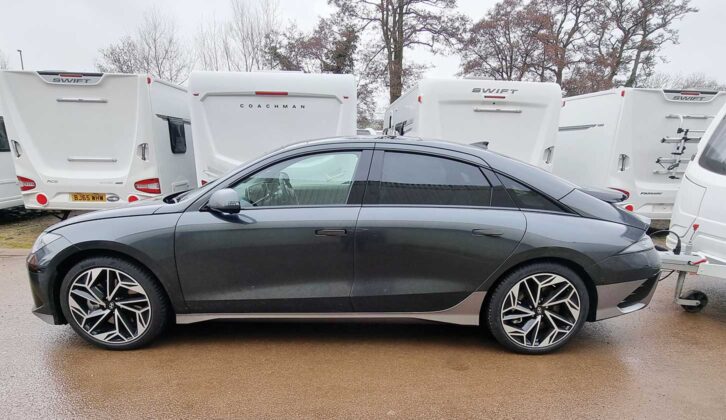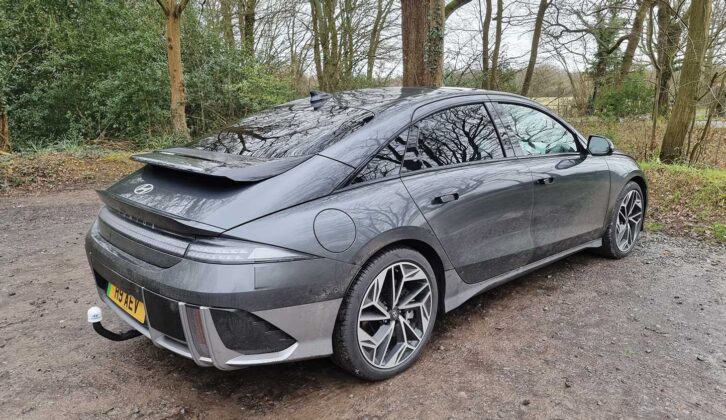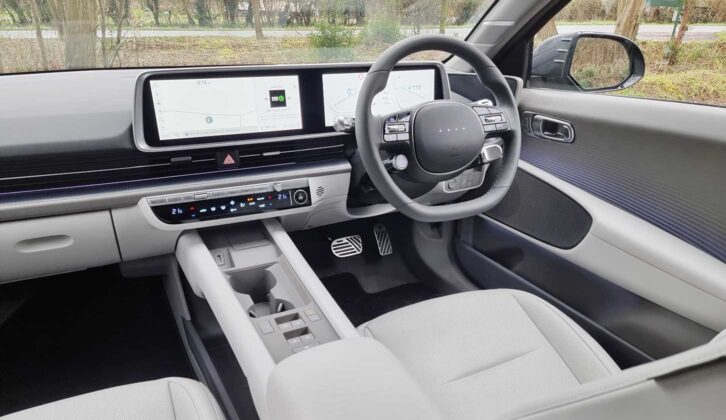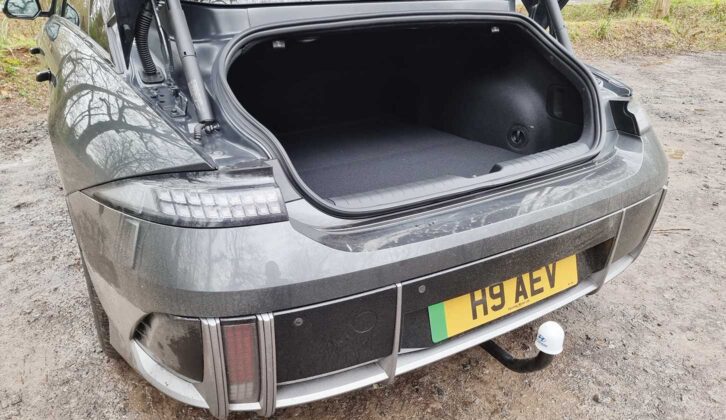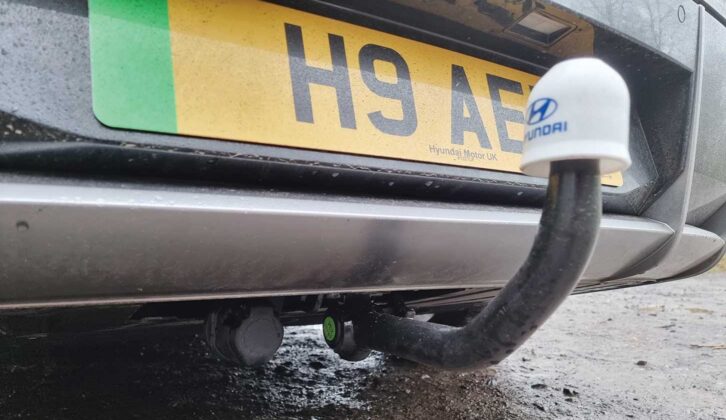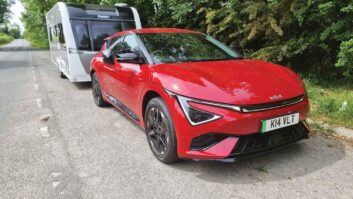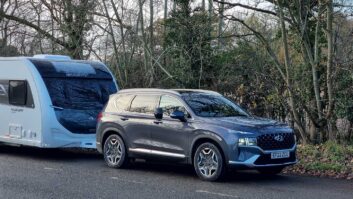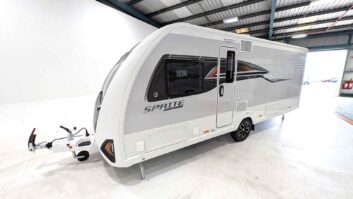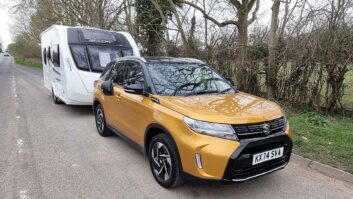Verdict
All of the usual caveats about range and recharging while towing a caravan apply to the Hyundai, as much as any other EV. But aside from that, the Ioniq 6 is a quick, stable and accomplished vehicle.
Pros
None
Cons
None
The Ioniq 6 is Hyundai’s four-door electric saloon. It shares much with the brand’s more practical Ioniq 5 SUV, but with an aerodynamic body that’s designed to look good and maximise the range. It’s available with rear- and four-wheel drive. I’ve been testing the high-spec, high-powered 4×4, the Hyundai Ioniq 6 Ultimate 4WD.
What am I looking for in the Hyundai Ioniq 6?
The best caravan tow car will offer stability and reliability, but is a saloon practical enough for towing? Just how far can the Ioniq 6 travel on a full charge?
Towing ability of the Hyundai Ioniq 6 Ultimate 4WD
An electric saloon isn’t the most obvious tow car, but lower those raised eyebrows for a moment. The Ioniq 6 4WD weighs well over two tonnes and has a maximum towing capacity of 1500kg.
That’s respectable for an EV, especially when you consider that a Volkswagen ID.7 costs similar money but only tows 1000kg, something which will be a consideration when matching a car to a caravan.
The Hyundai’s towing credentials are boosted by its 325hp and 446lb ft of torque, which lend the Ioniq 6 a serious turn of speed, even while towing.
I borrowed a Coachman Acadia 575 with a MiRO of 1415kg from Broadlane Leisure in Kenilworth (now Spinney Warwickshire). The Hyundai pulled the caravan confidently from the get-go, with an immediate but smooth response to the throttle. Reaching 50mph on country roads was completely effortless.
Moving onto the motorway, the Ioniq 6 was up to 60mph, the speed limit when towing a caravan, well before the end of the slip road and held that speed comfortably. In fact, the driver needed to pay attention to avoid driving faster than intended.

The Hyundai offers caravanners stability as well as pace. Aside from slight nudging from the van around HGVs and coaches, there was very little movement at speed.
Whenever I felt the caravan moving gently from side to side, the Hyundai soon pulled it straight again.
It coped well with wet weather as well as high speeds. Making a hill start on a 1-in-10 slope couldn’t have been easier, with the electronic parking brake holding car and caravan still before releasing smoothly.
Thanks to plenty of pulling power and four-wheel drive, the Hyundai accelerated quickly up the hill with no wheelspin.

Towing over a variety of roads, the Hyundai returned 1.7 miles per kilowatt hour. Given the battery’s capacity of around 74kWh, that gives a range of 126 miles.
In warmer weather, that might stretch a few more miles, and a lighter caravan should also improve the range a little. Even so, you will need to recharge the Ioniq 6 more often than you would have to refuel a petrol or diesel tow car.
Another potential gripe is the position of the 13-pin socket, which is a long way under the back bumper.

Solo driving
The Ioniq 6’s suspension is quite firm around town, but the set-up feels well judged on country routes and A-roads. Predictable braking and a measured response to the throttle make the Hyundai an easy car to drive smoothly. But if you do want to get a move on, the vehicle has sports car pace.
Light steering keeps the driver at arm’s length, but the handling is grippy and composed. In tight corners, you can feel the car’s weight – it’s not as keen to change direction as a lighter machine – but even so, this is a very satisfying drive.

There’s a little wind noise at speed, as well as some road noise, but neither really disturbs the peace. It’s a quiet, comfortable car for motorway miles.
Better vision over your shoulder would help with parking, but with front and rear parking sensors and surround-view cameras, it’s not much of an issue. Add in the best caravan sat nav and you’ll be all set for an enjoyable towing experience.
Space and practicality
There’s plenty of space in the front, with enough legroom and headroom for taller drivers. Both front seats adjust electrically on all Ioniq 6 models, while Ultimate spec includes a memory function.
The interior is uncluttered, but some of the plastics don’t look or feel especially plush, considering the car’s price point.

Tall passengers won’t be so happy sitting in the back, where the car’s sloping roofline steals a fair bit of the headroom.
For a four-door, the Ioniq has respectable luggage space. There are 401 litres for bags, although the narrow opening makes loading anything bulky a bit awkward.
You’ll find more space up front where the engine would be in a conventional car, but the capacity is just 14.5 litres in the model we’ve been driving. The two-wheel drive has a useful 45 litres there.
Hyundai Ioniq 6 Ultimate 4WD price
With a price of £54,040 for this high-spec model, the Ioniq 6 is more expensive than a Tesla Model 3, but cheaper than the equivalent BMW i4. If you are happy with rear-wheel drive and less power, prices for the Hyundai start from £47,040.
Ultimate spec is generously equipped, with dual-zone climate control, a head-up display, a Bose stereo, leather seat facings and a comprehensive suite of driver aids.
The car is capable of charging at 350kW if you can find a suitable charger, which should boost the battery from 10-80% in just 18 minutes. It takes seven hours and 10 minutes to go from 10-80% using an 11kW home charger. Charge the battery fully and the range is 322 miles, although you’ll need ideal conditions to come close to that.
If you’re still unsure about the type of car to go for, check out our guide to hybrid vs plug-in hybrid vs electric to see the pros and cons to consider when picking the vehicle for you.
Alternatives to consider
The Nissan Ariya E-4orce Evolve provides quick, stable and comfortable towing and is able to take any inclement weather in its stride. There’s a great deal to like about the Genesis GV80 too, including a luxurious cabin, plenty of stability when towing and a great level of equipment.
Technical spec of the Hyundai Ioniq 6 Ultimate 4WD
- Price: £54,040
- What Car? Target Price: £51,643
- Retained value after three years: 50%
- Kerbweight: 2095kg (Inc 75kg for driver not included in Hyundai’s published kerbweight)
- 85% of kerbweight: 1781kg
- Gross vehicle weight: 2520kg
- Max towing limit: 1500kg
- Gross train weight: 4020kg
- Towball limit: 100kg
- Price of towball and electrics: TBC
- Boot size: 401 litres
- Payload: 425kg
- Test conditions: Damp
- Battery size: 77.4kWh
- Power (hp): 325
- Torque (lb ft): 446
- Official range: 322 miles
- Towing range: 126 miles
- CO2 emissions: 0g/km
- First year car tax: £0
- Second year car tax: £0
- Insurance group: 41E
- Euro NCAP rating: 5/5
If you’ve enjoyed reading this article, why not get the latest news, reviews and features delivered direct to your door or inbox every month. Take advantage of our brilliant Practical Caravan magazine SUBSCRIBERS’ OFFER and SIGN UP TO OUR NEWSLETTER for regular weekly updates on all things caravan related.
Technical Specifications
| Kerbweight | 2095* inc 75kg for driver not included in Hyundai’s published kerbweight kg |
| 85% KW | 1781 kg |
| Towball Limit | 100 kg |
| Maximum Towing Limit | 1500 kg |
| Power | 325 bhp |
| Torque | 446 lb ft |

